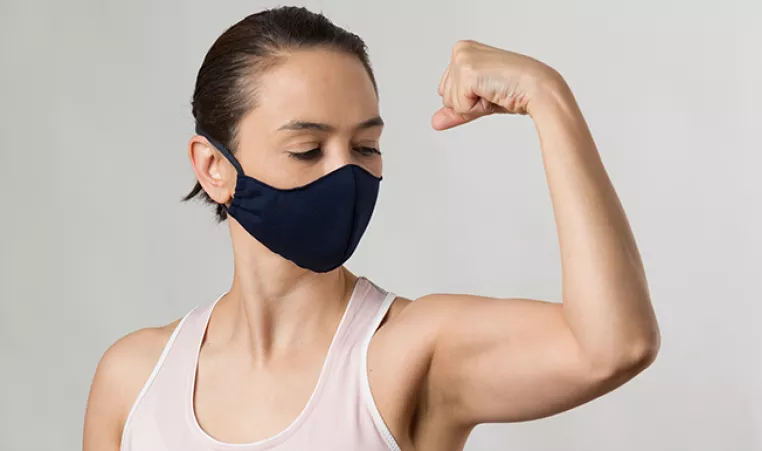
Exercise Is The Medicine For a Strong Immune System
We have all heard that exercise is good for your entire body. In these unprecedented times, there has never been a more important time to assess your health and ensure you are getting proper exercise every day. You need to keep your immune system healthy to prevent germs, harmful substances, viruses and toxins from making you ill. When you practice a healthy lifestyle, you are ensuring your immune system is strong.
Here are 6 ways exercise positively affects your immunity.
· Exercise promotes circulation that allows your body’s organs to work efficiently. Physical activity helps flush bacteria out of your system. This may reduce your chance of getting a cold, flu, or other illness.
· Exercise produces changes on the cellular level with antibodies and white blood cells that help your immune system fight off disease. During exercise, these antibodies or white blood cells circulate throughout the body quicker, so they could detect illnesses earlier than they might have before.
· During physical activity, your body experiences a brief rise in body temperature during and right after that may prevent bacteria from growing.
· Exercise slows down the production and release of stress hormones. Lower stress hormones keep the immune system healthy to prevent against illness.
· Exercise helps your body maintain a healthy weight, while strengthening muscles and preventing loss of bone density. Keeping your body strong will allow your immune system to do its job.
· Physical activity combats cardiovascular disease and Type 2 Diabetes. Keeping your heart healthy and maintaining your sugar levels will reduce your susceptibility to other illnesses.
How Can I Strengthen My Immune System?
Maintaining a healthy lifestyle is the key to a strong immunity. From choosing the right foods to eat and exercising each day, you will be on your way to strengthening your immune system. Here are 7 things to make your lifestyle healthy in order to boost your immune system.
· Eat a diet high in fruits and vegetables. Zinc, iron, folic acid are key vitamins to ensure your immune system’s response to fighting off infection is optimal. Find foods that include probiotics, omega 3s, vitamins and phytochemicals. Speak to your doctor before beginning any vitamin supplements plan.
· Decrease the amount of high-fat and high-caloric processed foods you eat. Initial research shows that these fast foods are seen as bacteria to the human immune system. Eating unhealthy foods over time may result in a more aggressive immune system. Nutrient-rich foods including cranberries, chicken, nuts, whole grains and greens can act as antioxidants to protect immune system cells. This will support your immune system and help your body produce antibodies.
· Exercise regularly. At least 150 minutes of moderate aerobic exercise or 75 minutes of vigorous exercise per week is recommended, but anything is better than nothing. There is research that found even 30 minutes of walking briskly increased white blood cell circulation and other important immune cells to fight off infection. A moderate program can consist of:
o Ride your bicycle with your children a few times a week
o Take 30-minute walks
o Go to the gym every other day
o Play golf regularly
· If you drink alcohol, drink only in moderation. Alcohol disrupts the bacteria in your gut which leads to inflammation in vital organs including stomach, liver, pancreas. This inflammation is your immune system’s response to bacteria, virus, and other unknown substances. In the long run, experts believe inflammation is at the core of many chronic and deadly illnesses.
· Get adequate sleep. Lack of sleep affects your immune system. Studies have shown that people who don't get at least 7 hours of sleep or quality sleep are more likely to get sick after being exposed to a virus. Most adults need at least seven hours of sleep, with teens, kids and infants needing progressively more; see the National Sleep Foundation’s chart for recommended sleep times.
· Continue to avoid infection. Wear your mask and wash your hands. Keeping hands clean is one of the most important steps we can take to avoid getting sick, keeping our immune system strong and preventing the spread of germs to others. Many viruses are spread by not washing hands with soap and water.
· Minimize stress through meditation, yoga, journaling, talking to friends. Long-term periods of unmanaged stress can lead to health problems like high blood pressure, increasing susceptibility to physical and mental illnesses, colds, anxiety and depression. Research has proven that having social support helps reduce stress.
· Don’t smoke. Smoking leads to profound negative changes within the immune system cells making it much harder for the body to fight off bacteria and infection.
At the YMCA of Long Island, we're working to keep you healthy - in spirit, mind and body. Need help starting a workout routine? Want to take your fitness to the next level? Get started with our Wellness Plan.
Stay mentally strong, and get social support here at the Y! Our YMCA Family Services team can help keep you connected.